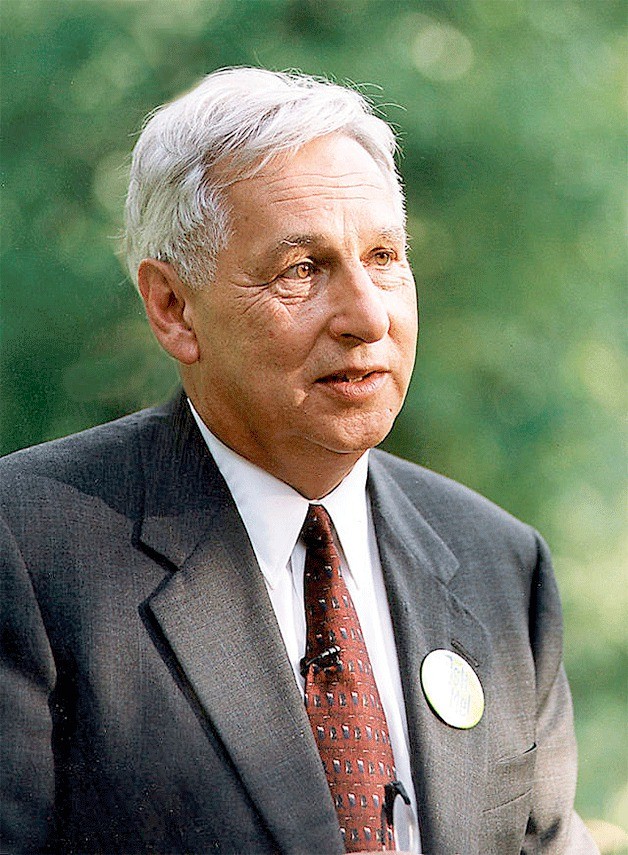South Whidbey is mourning the death of a long-time community and business leader this week.
Langley resident Paul Schell died unexpectedly Sunday morning after complications arose from an earlier surgery.
He was 76.
“It’s a very sad piece of news for Langley,” Langley Mayor Fred McCarthy said. “I can’t think of a lot of people who have had a more profound effect on this city.”
Schell, a former Seattle mayor, had a home in Langley for more than 30 years. The owner of two city inns, he was a well-known business leader and stalwart advocate of the arts.
His death hit the tiny South Whidbey community hard.
“It’s palpable — you can feel the sadness,” McCarthy said.
“For Langley, this an utterly profound loss,” said Sharen Heath, who runs the Facebook page I Love Langley.
Peter Miller, a Langley resident and family friend for nearly 40 years, said Schell died at about 6:30 a.m. He had a quadruple bypass heart surgery this past Wednesday and developed complications.
“At first he seemed fine, but it never settled,” Miller said.
He described Schell as a man who loved all of Puget Sound, but Langley in particular. Schell was devoted to the town’s success at all levels, he said.
“He wanted the town to work, he wanted the shops to work, he wanted the movie theater to work — he just loved Langley,” Miller said.
Schell was a mover and shaker in many areas of the city. He made his mark in business with the development of the Inn at Langley and the Boatyard Inn, but also built office space on Second Street in the 1980s, a time when there wasn’t too much there, according to Ann Medlock, founder of the Giraffe Heroes Project.
“Paul walked into our office and said, ‘This is worse than public television — you need a bigger space.’”
The blue giraffe building he constructed still houses the Giraffe Heroes Project upstairs — the Braeburn and Gregor Rare Books are located on the first floor. Medlock said she is relieved Schell got to attend the Second Street reopening earlier this month because in a way the road’s revitalization began with him years ago.
“Now it’s [Second Street] just blooming, and he started it,” Medlock said.
Schell also played a key role in the founding of Whidbey Island Center for the Arts. Exectutive Director Stacie Burgua said both he and his wife, Pam — a current member of the board of directors — worked tirelessly on the initial 1990s capital campaign to form the organization, along with a more recent effort in 2007.
“It just wouldn’t have happened without them,” Burgua said.
In an email to fellow WICA board members Sunday, chairman and South Whidbey businessman George Henny wrote, “Paul passed away this morning, and leaves an enormous hole in our hearts, lives and community.
“Paul has been an incredible, dynamic visionary and positive force in our community, and a steadfast supporter and ambassador for Whidbey Island Center for the Arts.”
According to Burgua, Schell had an impact on so many people, and was so involved in the city’s development that’s it hard to quantify the loss.
“Where didn’t he have an impact?” Burgua said. “Langley will never be the same without him.”
Schell’s life extended beyond South Whidbey, however, so much so that his death was announced to the world publicly by Seattle Mayor Ed Murray, sparking a plethora of print and broadcast stories by regional and national media outlets.
“Schell will be remembered as one of the great city builders of the Pacific Northwest,” said Murray, in a news release. “As a citizen activist, lawyer, director of community development, port commissioner, dean of architecture and mayor, he directly shaped the civic infrastructure of Seattle for more than 40 years.”
Schell wore many hats for the city, the most notable of which was as mayor from 1998-2002. According to Murray’s release, the infrastructure Schell built and influenced were his greatest professional accomplishments. He led a $196 million Libraries for All campaign, a $198 million levy for parks and the zoo, a $72 million effort of public and private funds to rebuild the opera house, and was instrumental in building the Olympic Sculpture Park, and Seattle’s City Hall and Justice Center, the news release said.
Schell, Seattle’s 50th mayor, saw difficulties in office as well, from the 1999 riots of the World Trade Organization conference to the departure of The Boeing Co.’s headquarters to Chicago. Schell ran for a second term but lost in a primary race.
Retiring from politics, Schell turned his attention to Langley. Starting a successful business, fostering development on Second Street and working to found WICA, an organization that in some ways has come to define Langley, Schell was involved in it all. Most recently, he was in the midst of partnering with the city on an elevator project to shuttle people from Cascade Avenue to the marina on Wharf Street.
Sue Frause, a Langley resident of nearly 40 years and a long-time friend of the Schell family, said in email to The South Whidbey Record that Schell simply loved the Village by the Sea. He and his wife bought a house in town decades ago and that passion never subsided.
From opening the inns to his influence on Second Street, Schell wanted the city to thrive and be a welcoming place for both locals and visitors alike, Frause wrote.
Schell and his wife planned to grow old here, surrounded by friends and a hometown he had given so much to, especially WICA, but it wasn’t to be.
“Sadly, his golden years were cut short, but the community is far richer because of Paul Schell,” Frause said.
Schell is survived by his wife of 51 years, Pam, and his daughter Jamie.



